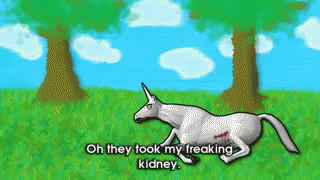🧂 Filtering Trouble: Understanding Kidney Disease and What Causes It

Health & Sciences | The Varrock Street Journal
Good morning to all of our wonderful readers!
Every day, your kidneys quietly clean your blood, remove waste, regulate electrolytes, and help control blood pressure. They’re about the size of a fist but do the work of a full chemical factory. Yet millions of people are walking around with impaired kidney function—and they don’t even know it.
In today’s newsletter, we’ll explore kidney disease, from its most common causes like diabetes and high blood pressure to its rare and hereditary forms, and explain how you can take steps to protect your health.

🧬 What Is Kidney Disease?
Kidney disease, also known as chronic kidney disease (CKD), occurs when the kidneys become damaged over time and gradually lose their ability to filter waste from the blood. This can lead to toxic buildup, fluid retention, and eventually kidney failure if not managed.
CKD progresses through five stages, from mild damage to complete kidney failure requiring dialysis or transplant.
Here is a video to better understand the normal kidney function!
💥 Common Causes of Kidney Disease
In most cases, kidney damage happens gradually and is linked to other health conditions:
🔹 Diabetes (Type 1 or 2)
- The leading cause of CKD in the U.S.
- High blood sugar damages the blood vessels in the kidneys
- This form is called diabetic nephropathy
🔹 High Blood Pressure (Hypertension)
- Second most common cause
- Extra pressure damages kidney arteries, reducing function over time
🔹 Heart Disease
- Impacts blood flow to kidneys and can lead to secondary damage
🔹 Recurrent Urinary Tract Infections or Kidney Stones
- Chronic inflammation or blockages can cause permanent scarring
🧬 Uncommon and Hereditary Causes
While diabetes and hypertension dominate the headlines, not all kidney disease is preventable or lifestyle-related. Some are rooted in genetics, autoimmune conditions, or structural abnormalities.
🔸 Polycystic Kidney Disease (PKD)
- A hereditary disorder where fluid-filled cysts grow in the kidneys
- Can lead to kidney failure by middle age
- Passed through families with an autosomal dominant inheritance pattern
🔸 Alport Syndrome
- A rare genetic condition affecting the kidneys, ears, and eyes
- More common in males and can lead to hearing loss and kidney failure
🔸 Lupus Nephritis
- An autoimmune disorder where the immune system attacks the kidneys
- Seen in people with systemic lupus erythematosus (SLE)
🔸 Congenital Abnormalities
- Some people are born with malformed kidneys or urinary tracts
- Can be caught early in childhood screenings

🩺 How Is Kidney Disease Diagnosed?
Kidney disease can go undetected until it’s already advanced, which makes screening essential for at-risk individuals. Common diagnostic tools include:
- Blood tests: Check creatinine and eGFR (estimated glomerular filtration rate)
- Urine tests: Look for protein (albuminuria) or blood
- Ultrasound or CT scans: Detect cysts, blockages, or structural problems
- Biopsy: Sometimes used for rare or unexplained conditions
💊 Treatment Options
Treatment depends on the underlying cause and stage, but may include:
- Blood pressure control with ACE inhibitors or ARBs
- Blood sugar management in diabetics
- Dietary changes to reduce sodium, phosphorus, and potassium
- Avoiding nephrotoxic medications like NSAIDs
- Dialysis in end-stage cases
- Kidney transplant as a curative option for advanced failure
In hereditary or autoimmune diseases, early genetic screening and immunosuppressive therapy may help delay damage.
🧠 Why This Matters
Kidney disease affects over 1 in 7 American adults, yet 90% of people don’t know they have it until it's late-stage. With routine screening, early detection, and lifestyle changes, most kidney damage is preventable—or manageable.
And by recognizing rare causes, we can improve early diagnosis and reduce the burden of silent disease in families.
🌟 Spotlight on the Future
- Artificial kidneys and wearable dialysis machines are in development
- Gene therapy is being explored for inherited conditions like PKD
- Biomarkers for earlier detection are being validated
- Public health campaigns are pushing for universal kidney screening by age 50
😲 Did You Know?
- Your kidneys filter about 50 gallons of blood every single day
- A person can lose up to 90% of kidney function without noticeable symptoms
- Coca-Cola-colored urine can be a sign of glomerulonephritis or muscle breakdown affecting the kidneys
For anyone who has taken a science class in undergrad, you may remember a student favorite... Ninja nerd! Check out his podcast discussing our topic!
🧠 Reflection Questions
- When was the last time you or a loved one had your kidney function checked?
- Could a family history of kidney disease mean you're at higher risk?
- How can we raise awareness about lesser-known kidney conditions?
👋 Final Thoughts
Your kidneys work around the clock to keep you balanced, detoxified, and alive. Whether your risk is related to lifestyle or genetics, knowing what causes kidney disease—and how to catch it early—can make all the difference.
📚 References
- National Kidney Foundation. (2024). Chronic Kidney Disease Overview. https://www.kidney.org
- Mayo Clinic. (2024). Polycystic Kidney Disease and Inherited Conditions. https://www.mayoclinic.org
- CDC. (2024). Kidney Disease Statistics for the United States. https://www.cdc.gov
- NIDDK. (2024). Rare Kidney Disorders. https://www.niddk.nih.gov
📲 Filter your facts with us weekly:
- Instagram: @thevarrockstreetjournal
- TikTok: @varrock.street.jo
